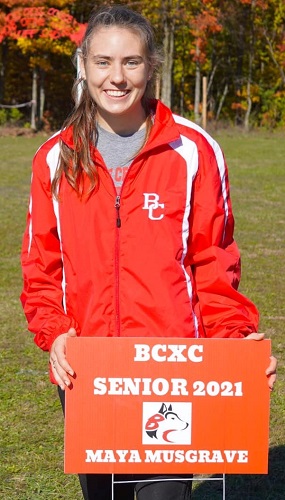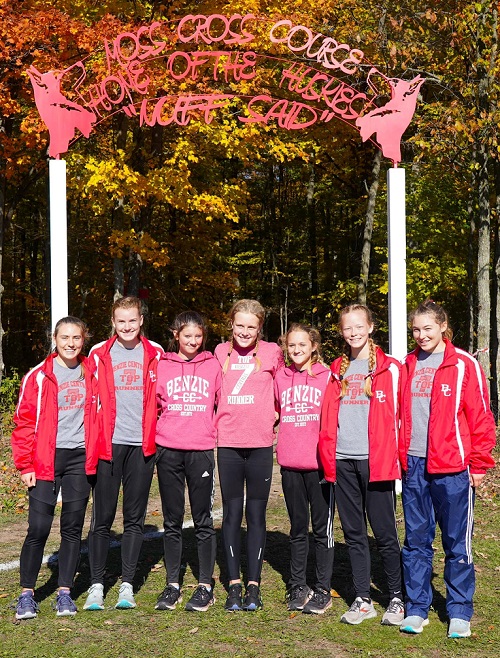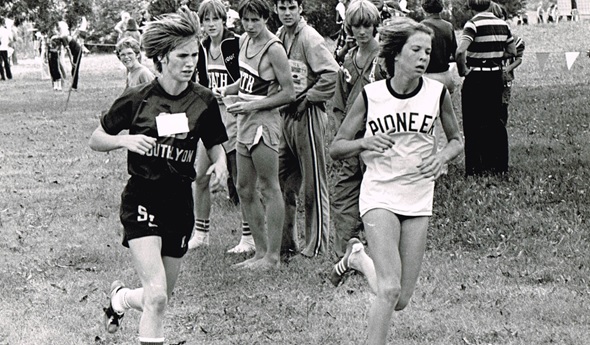
Musgrave's Iron Deficiency Work to Help Athletes 'Know If You're Low'
By
Tom Spencer
Special for MHSAA.com
November 5, 2021
Maya Musgrave wants every female high school cross country runner to know her story. And she wants to help everyone with a similar one.
 Boys, too, should take notice of what the Benzie Central senior has gone through. Her brothers already have. And, they got help.
Boys, too, should take notice of what the Benzie Central senior has gone through. Her brothers already have. And, they got help.
Both the boys and girls Benzie runners have qualified for this weekend’s MHSAA Lower Peninsula Finals. The girls would not have made it without her leadership and contribution to the team. Perhaps the boys wouldn’t have either.
When she graduates in the spring, it won’t necessarily be Musgrave’s running performances people will remember. She’s in the process of starting a non-profit agency to create awareness for anemia and make iron blood testing free for future Benzie runners.
Now to her story. Musgrave started running cross country as a freshman. Her brothers Michael and Quinten also run for the Huskies.
Maya, who will be named to the academic all-state cross country team this weekend, got back into running her junior year, after recovery from an earlier surgery. She ran her best time of the season in the school’s first race.
But, Musgrave’s times dropped every race after. She and her coaches knew it wasn’t her training or effort. She and her family struggled with low energy and breathing difficulties.
 Upon receiving Musgrave’s blood test results, her personal physician actually asked Musgrave how she had been avoiding passing out. Her coaches wondered how it was possible she was staying awake during the day, let alone run.
Upon receiving Musgrave’s blood test results, her personal physician actually asked Musgrave how she had been avoiding passing out. Her coaches wondered how it was possible she was staying awake during the day, let alone run.
Musgrave’s lab revealed she had iron levels just 10 percent of what they should be. She went through two iron infusions to get her levels to normal. Infusions are usually prescribed by doctors to treat iron deficiency anemia, or when needed to increase iron levels fast to avoid medical complications or a blood transfusion. They also are prescribed for iron deficiency anemia when dietary changes and iron supplements are not enough.
Her story has already led to iron testing of the entire Benzie girls team and some of the boys. Low iron levels are very common among female athletes, and to a lesser extent found among male runners. The testing revealed her brothers had low levels, as did half the girls team.
The cost of the testing was covered by Musgrave personally, with help from her family. The next step was to start the education process. She arranged to bring in Abigail Ellsworth, a local neuropathic doctor and acupuncturist, to speak to the team. Ellsworth also had volunteered her time to draw blood for the team testing.
Today, Musgrave is working with an attorney to set up her nonprofit called Know If You're Low. Once it is set up, the nonprofit will provide free iron testing and education for female runners at Benzie on an annual basis.
So others don’t have to, is Musgrave’s motivation.
“I just figured it had been a problem for girls in the past, it was obviously going to be with girls in the future as well, so I might as we’ll tell my friends about it and tell my teammates about it so they can get it checked and not have to worry about it like I did,” she said. “I didn’t want them to have to go through that.”
Her coaches, Asa and Traci Kelly, were among the first to suggest iron could be at the crux of her struggles. They’ve seen a lot of runners struggle with iron counts during their coaching and competitive personal running careers.
“She was at the point where we were consoling her after races and saying, ‘Hey, we’re sure this is what is going on,’” Asa Kelly said. “‘You just got to get tested.’”
Other than the extreme low levels, Musgrave’s story fits a pattern the Kellys have seen too often – watching times get slower without a known cause, thinking perhaps the athlete is not working hard enough and having kids quit the sport because of it.
 “A lot of coaches, a lot of athletes, a lot of parents just don’t understand how critical (iron levels are),” said Asa Kelly. “I think the biggest thing is back 30 or 40 year ago, you would just keep beating the horse.
“A lot of coaches, a lot of athletes, a lot of parents just don’t understand how critical (iron levels are),” said Asa Kelly. “I think the biggest thing is back 30 or 40 year ago, you would just keep beating the horse.
“Low and behold many of these kids had underlying issues.”
The Kellys coach boys and girls cross country at Benzie. Their daughter Mylie broke the school record at the Regional last week and hopes to qualify for the all-state team again this year as a sophomore.
They’ve seen a couple of runners every year test low for iron when it was considered a possible culprit for decreasing performance. They can’t help but wonder what results would have shown if they had tested all the boys and girls every year. Musgrave may make that possible going forward.
“If coaches could be proactive with this kind of thing, imagine the difference in some of the lives of these kids you could make,” Asa Kelly said. “All of a sudden, ‘I just thought I was an OK runner on the team and I was just tired all of the time’ to maybe this kid has this untapped ability they are never going to discover just because of something that’s out of their control.”
Musgrave, who still takes iron supplements, has launched a website, KnowIfYoureLow.com.
“We figured that if people want to know more about this, there probably should be a website for them to go look at it,” Musgrave said. “It’s just a place that A, people can read information about this program, and B, donate if they want to. The money will go for paying for the actual blood test.”
Musgrave is undecided about college plans right how. Her coach believes she could land at one of the nation’s finest academic schools.
“She’s a spark plug,” Kelly said. “She’s a girl that is going to go places in this world for sure.
“She brings that poise, that confidence.”
 Tom Spencer is a longtime MHSAA-registered basketball and soccer official, and former softball and baseball official, and he also has coached in the northern Lower Peninsula area. He previously has written for the Saginaw News, Bay County Sports Page and Midland Daily News. He can be reached at [email protected] with story ideas for Manistee, Wexford, Missaukee, Roscommon, Ogemaw, Iosco, Alcona, Oscoda, Crawford, Kalkaska, Grand Traverse, Benzie, Leelanau, Antrim, Otsego, Montmorency, Alpena, Presque Isle, Cheboygan, Charlevoix and Emmet counties.
Tom Spencer is a longtime MHSAA-registered basketball and soccer official, and former softball and baseball official, and he also has coached in the northern Lower Peninsula area. He previously has written for the Saginaw News, Bay County Sports Page and Midland Daily News. He can be reached at [email protected] with story ideas for Manistee, Wexford, Missaukee, Roscommon, Ogemaw, Iosco, Alcona, Oscoda, Crawford, Kalkaska, Grand Traverse, Benzie, Leelanau, Antrim, Otsego, Montmorency, Alpena, Presque Isle, Cheboygan, Charlevoix and Emmet counties.
PHOTOS (Top) Benzie Central’s Maya Musgrave runs during a cross country race this fall. (Middle) Musgrave is a senior this season and forming a nonprofit to pay for iron deficiency testing for athletes. (Below) Musgrave, far left, with teammates Elise Johnson, Nora Grossnickle, Mylie Kelly, Ava Iverson, Hayley Vanwagoner and Ella Gaylord. (Photos courtesy of Benzie Central cross country program.)

Pioneer's Huff Blazed Cross Country Trail
October 3, 2017
By Ron Pesch
Special for Second Half
Today, you’ll find her seated behind a desk in Denver. A CPA and the mother of three, including a former Olympic speed skater, Beth Jurgensmeyer still runs. The MHSAA’s first girls individual cross country champion, she was introduced to the sport as an 8-year old.
The daughter of Reverend Robert O. Huff, a Lutheran minister, and his wife Jane, she was born in Indianapolis. The fifth of six children and the couple’s first daughter, she and the family moved to Midland when Beth was a baby.
“I had a kidney infection,” said Jurgensmeyer, “and a doctor had told us that running would help clear it up. Now I don’t know if that was true, but I started running for Fleet Feet in Midland. It was fun.”
Still going strong today, Fleet Feet was formed in 1967. A track and field and cross country program, it was designed with the goal of keeping kids active. The club competed in AAU competitions, and Huff excelled.
A friend and fellow runner from Fleet Feet introduced her to speed skating.
“Cindy Kressler invited me to skate with her family in the park in Midland. Her brother, Craig, was a pretty good speed skater and ended up an Olympian in 1980. So, I did that in the winter.”
Huff excelled in that sport as well, skating for the Midland Speed Skating Club and earning “Pony Girl“, “Midget” and “Junior” recognition at Michigan Skating Association-sponsored events across the state, and at other races around the Midwest.
“My brothers were all older than me, and they all played sports,” she added. “Football, basketball, baseball, hockey. So I competed too.”
 But in sixth grade Huff’s family moved. Pastor Huff had received a call to a church in Ann Arbor. It was his fourth assignment.
But in sixth grade Huff’s family moved. Pastor Huff had received a call to a church in Ann Arbor. It was his fourth assignment.
“There, I continued to skate, now with the Wolverine Club (based out of Detroit). I ran with the Michigamme Club, and we were coached by (Kenneth) ‘Red’ Simmons.”
Born in 1910, Simmons was a football and track star at Redford High School in Detroit, then at Michigan Normal College (now Eastern Michigan University) before serving 25 years with the Detroit Police Department. Upon retirement Simmons, along with his wife, formed “The Michigammes,” a women’s track club designed to allow girls to compete. In 1976, he was named the first coach in the history of women’s track and field at the University of Michigan.
Huff never missed a beat, winning more than a dozen state age group championships between 1973 and 1976.
“I attended Slauson,” she continued. “That fed into Ann Arbor Pioneer. Back then, it was the only high school in Ann Arbor that had 9th grade. I liked that. You go there you’re the little kid, running with the older ones, trying to keep up. You’re able to keep a low key. I wasn’t very big, and the uniform was sliding down my shoulders. My Mom took it to a seamstress and had mine altered so it would fit.
“My parents never pressured me. My participation was never assumed. Each year, my Dad would ask me a question, ‘Beth, do you want to run again?’ I did - I loved to run. I’d sleep in my shorts and shirt, wake up in the morning, slip on my shoes and run before class. Because of Fleet Feet and The Michigammes, I’d run hundreds and hundreds of races before I got to high school. I knew I was pretty good, but I always liked to be kind of unknown.”
Flying under the radar didn’t last long. By season’s end, Huff, along with sophomore Dana Loesche, had emerged as the team’s top runners.
“After my freshman year, people suggested I run between cross country and track seasons,” Jurgensmeyer recalled. “I told them, ‘I skate in the winter.’”
Now coached by Scott Hubbard, Huff was Pioneer’s top runner as a sophomore and led the cross country team through a stellar year.
Hubbard had run in high school for Ann Arbor Huron and later at Eastern Michigan University. Many today know Hubbard as the longtime voice of the Detroit Marathon. “Beth was very, very good. She was just average size, but she was whippet fast,” he said. “(But) at the state level, cross country for girls was not a sport sponsored by the MHSAA in 1977.”
 Yet since 1975, an unsanctioned state championship was hosted in Michigan. In both 1975 and 1976, the event was held at Ann Arbor Pioneer. The 1977 event was run at Potterville High School in November. A total of 370 runners from 105 schools competed in the meet, a substantial increase from the 243 runners that had participated a year previous. Miriam Boyd of Port Huron, one of Michigan’s all-time great prep distance runners, finished with the top individual time, followed by Carol Schenk of Flint Kearsley and sophomore Huff. Crosstown rival Ann Arbor Huron ended the day with the team honor, while Pioneer finished third in Class A.
Yet since 1975, an unsanctioned state championship was hosted in Michigan. In both 1975 and 1976, the event was held at Ann Arbor Pioneer. The 1977 event was run at Potterville High School in November. A total of 370 runners from 105 schools competed in the meet, a substantial increase from the 243 runners that had participated a year previous. Miriam Boyd of Port Huron, one of Michigan’s all-time great prep distance runners, finished with the top individual time, followed by Carol Schenk of Flint Kearsley and sophomore Huff. Crosstown rival Ann Arbor Huron ended the day with the team honor, while Pioneer finished third in Class A.
“It was different then,” said Jurgensmeyer, laughing. “My Mom would make me a peanut butter and jelly sandwich. On race days there would be two oranges and a Hershey bar. Now, they’d tell you that all that sugar would not be the best thing for you. After a race, you’d go to the car, grab a clean shirt, go to the awards ceremony and go home. My Dad, he couldn’t really watch many races. Saturday’s were busy, as he had weddings or prepared for Sunday. Sometimes, when I would run, he’d be there standing with four or five others from church, as they prepared to go to a meeting. He couldn’t stay the whole race, and that was OK.”
“While in Ann Arbor I met a man, John McCravey, who was in medical training at the University of Michigan,” Jurgensmeyer remembered. “He was one of the people who really wasn’t afraid to offer something other than praise. ‘Beth, your arm swing is awful!’ It was nice to hear criticism. I could get better.”
Today, Dr. John McCravey still practices in Tennessee.
“I had come to U of M for a one-year residency. I had run at Dartmouth, and coached while going to med school in Memphis. In Ann Arbor, I worked with Elmo Morales, the founder of the Ann Arbor Track Club. We started age group cross country. The running boom was on, and Ann Arbor was a hotbed. Beth was older than many of the pupils in the program, and clearly a lot better than most at that point. We became running pals. (Because of) the skating, she had great endurance.”
The pair logged hours in the streets of Ann Arbor, including time during the brutal winter of 1977-78.
 “We talked the whole time. As a coach, it’s great when you can run with a student. You can see what they’re doing, feel the biomechanics, and offer advice. ”
“We talked the whole time. As a coach, it’s great when you can run with a student. You can see what they’re doing, feel the biomechanics, and offer advice. ”
In Class A in the spring of 1978, Huff finished second to Boyd in the two-mile at the MHSAA’s sixth annual Girls Track and Field Meet. In the fall, Huff, now a junior, earned Michigan’s first Lower Peninsula Open Class cross country individual championship.
Seven months later, Huff would win the two-mile in track. Only, it wouldn’t be in Michigan.
In December 1979, the Huff family left Ann Arbor for Janesville, Wisconsin, as her father accepted a new assignment.
At Craig High School, Huff again joined the cross country and track teams and quickly emerged as their top runner. Her 10:53.19 time at the Division 1 Wisconsin Interscholastic Athletic Association championship meet set a new state mark. During her senior year in Wisconsin, a case of mononucleosis and a stress fracture set her back, and impacted her running seasons.
Her next move was on to college, where she ran for the University of Tennessee. There, she competed in the 10,000 meters. After college, she married, had kids, and stopped running competitively. After returning to Midland, she resumed speed skating, and introduced her kids to the sports she loved. She coached them as far as she could.
Jurgensmeyer’s son, Ryan Bedford, excelled in cross country at Midland High School before hanging up the shoes to focus on speed skating. He was a 2009 world champion and a member of the 2010 Olympic team. Daughter Kristin also excelled as a runner and speed skater. Beth’s oldest son stayed with the more traditional sports of football and basketball.
Reflecting back on her years as an athlete and as a coach, she added, “Today, parents are overly involved. It’s so high-pressure so early that kids become miserable. Research shows if you start specializing kids too young in one sport, they will be done by age 18. I always wanted my kids to try all sorts of sports and not just specialize. Just let kids fall. Let them get dirty.”
“Really, women’s sports are the best thing to ever happen to sports,” said Hubbard, remembering the long haul involved in opening up those opportunities to the girls. “I was so fortunate to be witness to that. The world is really much richer because of it.”
 Ron Pesch has taken an active role in researching the history of MHSAA events since 1985 and began writing for MHSAA Finals programs in 1986, adding additional features and "flashbacks" in 1992. He inherited the title of MHSAA historian from the late Dick Kishpaugh following the 1993-94 school year, and resides in Muskegon. Contact him at [email protected] with ideas for historical articles.
Ron Pesch has taken an active role in researching the history of MHSAA events since 1985 and began writing for MHSAA Finals programs in 1986, adding additional features and "flashbacks" in 1992. He inherited the title of MHSAA historian from the late Dick Kishpaugh following the 1993-94 school year, and resides in Muskegon. Contact him at [email protected] with ideas for historical articles.
PHOTOS: (Top) Ann Arbor Pioneer's Beth Huff, right, runs just ahead of South Lyon's Cheryl Scheffler during the Ann Arbor Greenhills Invitational in 1978. (Middle top) Huff, second row and third from right, was a freshman on the 1976 near-undefeated Pioneer cross country team that lost only to Livonia Stevenson. (Middle below) In this clip from the Detroit Free Press' Sunday magazine, Huff is shown running in Ann Arbor with Pete Hallop, far left, and Mike Lutz, who went on to play bass for rock group Brownsville Station. (Below) Huff, top row second from right, starred as well for Pioneer's 1979 cross country team, winning the first MHSAA individual championship in the sport. (Photos courtesy of Beth Huff.)

